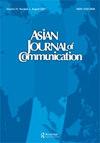Rethinking Asian values in journalism: the case of the pressroom in the South Korean presidential office
IF 1.5
2区 文学
Q2 COMMUNICATION
引用次数: 0
Abstract
ABSTRACT The present study explored how Asian values are reproduced in South Korean journalistic practices. In-depth interviews were conducted with journalists covering the Korean presidential office. The results revealed that Asian values prioritizing harmony, authority, national interests, and order influence the pressroom of the presidential office. The reporters run dozens of mobile-messenger-based groups, called kumis, with fellow reporters to share information and jointly contact officials. This practice embodies an Asian value – in-group harmony, derived from Confucian communalism. The beat (areas covered by reporters) and pressroom system institutionalizes Asian values by allowing only registered reporters to access the presidential office. The president’s staff abuses off-the-records and embargoes, but the reporters accept them out of respect for the president’s authority. The reporters often make headlines on the president’s national security agenda. We also found the hybridity of Asian values and watchdogs in the Korean reporters’ practices. Partisan bias is a mediator determining whether to activate Asian values or watchdog roles. Asian values are in excess between ideologically homogenous reporters and presidents, while government watchdogs are stimulated between heterogeneous pairs. As press freedom grows in Asia, the model of blending Asian values with other journalistic attributes is likely to be found often.亚洲新闻价值观的再思考——以韩国总统府新闻室为例
摘要本研究探讨了亚洲价值观是如何在韩国新闻实践中重现的。对报道韩国总统府的记者进行了深入采访。结果显示,亚洲重视和谐、权威、国家利益和秩序的价值观影响着总统府的新闻发布室。记者们经营着数十个名为kumis的移动信使小组,与其他记者分享信息并共同联系官员。这种做法体现了一种亚洲价值观——源自儒家社群主义的群体和谐。节拍(记者覆盖的区域)和新闻室系统只允许注册记者进入总统办公室,从而使亚洲价值观制度化。总统的工作人员滥用记录和禁运,但记者们出于对总统权威的尊重而接受了这些记录和禁运。记者们经常成为总统国家安全议程的头条新闻。我们还在韩国记者的实践中发现了亚洲价值观和监管机构的混杂。党派偏见是决定是激活亚洲价值观还是监管角色的中介。意识形态同质的记者和总统之间的亚洲价值观是过度的,而政府监管机构则在异质的两人之间受到刺激。随着亚洲新闻自由的发展,将亚洲价值观与其他新闻属性相结合的模式可能会经常出现。
本文章由计算机程序翻译,如有差异,请以英文原文为准。
求助全文
约1分钟内获得全文
求助全文
来源期刊

Asian Journal of Communication
COMMUNICATION-
CiteScore
3.70
自引率
0.00%
发文量
38
期刊介绍:
Launched in 1990, Asian Journal of Communication (AJC) is a refereed international publication that provides a venue for high-quality communication scholarship with an Asian focus and perspectives from the region. We aim to highlight research on the systems and processes of communication in the Asia-Pacific region and among Asian communities around the world to a wide international audience. It publishes articles that report empirical studies, develop communication theory, and enhance research methodology. AJC is accepted by and listed in the Social Science Citation Index (SSCI) published by Clarivate Analytics. The journal is housed editorially at the Wee Kim Wee School of Communication and Information at Nanyang Technological University in Singapore, jointly with the Asian Media Information and Communication Centre (AMIC).
 求助内容:
求助内容: 应助结果提醒方式:
应助结果提醒方式:


